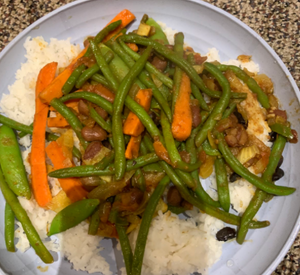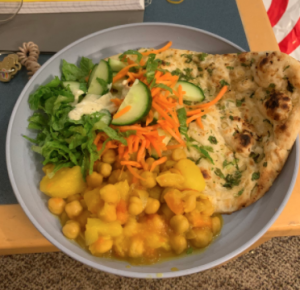It’s Called ~Adulting~
Coming back to college after a year at home, I was nervous to go from having guaranteed home cooked meals everyday to needing to plan my own meals, keep track of ingredients, buy groceries, and, of course, cook. The last time I had been on campus — my freshman year — I had a dining plan and ate most of my meals at Bay State Dining Hall.
Coming back as a junior without a dining plan, I was sure that after a week of trying to cook, I’d be eating instant ramen every day. But here we are, in November, and I am pleasantly surprised with how I’ve been able to pretty consistently make myself food that I enjoy.
Tip 1: Learn basic recipes that you can apply to many different ingredients
This, like most (okay, all) of my cooking knowledge, comes straight from my mom. In my last couple of months at home, I practiced making recipes with her that I’d grown up eating my whole life. The most surprising—and reassuring—thing I learned was that if I could master one recipe, I could almost automatically master two or three others at the same time!
For example, the recipes for the two types of beans pictured below (garbanzo beans and kidney beans) are actually exactly the same! They both contain chopped onions, potatoes, and tomatoes along with all the same spices — the only difference is which beans I added.
This method is a super easy way to mix up your meals without having to learn too many different recipes.
Tip 2: Know what kitchen items you absolutely need stocked
As you learn more recipes and get in the groove of cooking for yourself, you’ll start recognizing which ingredients you use the most consistently and which run out the fastest. These will differ for everyone depending on what type of food you tend to cook, but for me, I’ve noticed that I use olive oil, garlic, and a variety of spices in almost every recipe I make.
For large items, like olive oil, my roommates and I have one big bottle that we share. If everyone in your apartment agrees to it, sharing some big items (either splitting cost or repurchasing on a rotating basis) can help you keep your kitchen free of clutter. And, you don’t have to worry about keeping track of whose is whose if everyone is using the same thing!

Tip 3: Make last night’s leftovers today’s lunch
I always make at least two servings of food for myself when I cook, sometimes even more if I know my next day or two are super busy. Having a shared refrigerator with limited space makes it impractical to meal prep too many items, so I try to be smart about how I can use the same leftovers in combination with a few distinct ingredients to make different second-day meals.
For example, one way I repurposed the kidney beans (pictured under Tip #1) was to eat them with rice and other vegetables the next day. This way, you’re still getting some variety in your meals, but you don’t have to go through all the effort of cooking an entire new meal each time.
I recommend getting a few light tupperware you can take with you to campus for the day if you won’t be home for lunch, but still want to eat your cooked food instead of spending money. You don’t need anything fancy or even a lunchbox — I usually put my tupperwares in a plastic bag (in case of spills) that I slip into my backpack, or if I’m bringing a sandwich, I just wrap it in plastic and tin foil and I am good to go! (If you can find more eco-friendly alternatives, that is even better!)
Learning to cook for yourself can be daunting at first, and there is definitely a learning curve that comes with it. The best advice I have is to practice, practice, practice. If you can, ask someone (parents, other family members, older siblings, friends, etc.) to write down recipes for you that you can follow along with as you are learning. It may seem like overkill, but it really helps mitigate the stress of all the multitasking you’ll inevitably do in the kitchen.
Lastly, know that you can do it! No matter how much I practiced at home, I didn’t feel confident in my ability to cook at all until I actually got to school and was fully responsible for my own diet. It may seem like you’re diving off the deep end, but you are probably better equipped to handle it than you think!

